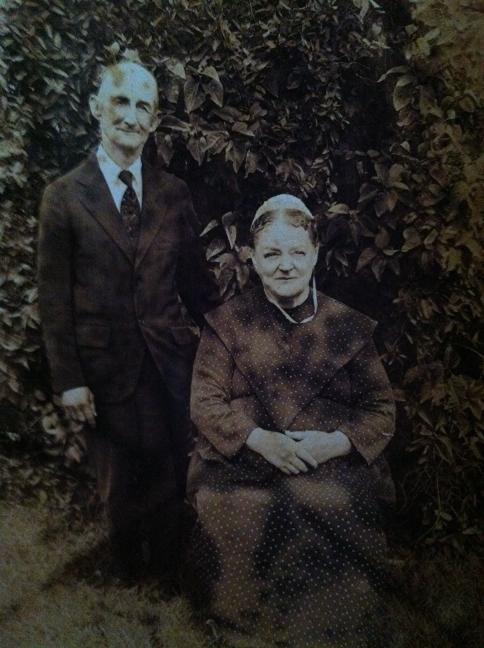
Wiry Grandpa Martin, was a jolly little man. He had an Old MacDonald-type farm with chickens, a couple of cows, two horses, and maybe a pig though I never heard an oink-oink-oink either here or there.

Oil painting by Ruth Martin Longenecker

Theirs was a Jack Sprat-type union, with his wife Mary as generous as she was ample. Great Grandma Mary died before I was born, so I never met the big-hearted woman who often invited strangers to the family table.
My Grandma Longenecker’s dad, Great-Grandpa Samuel Brinser Martin, came to live with his daughter Fannie and grand-daughter, my Aunt Ruthie, in his later years. My sisters and I found him curious and amusing.
Great-Grandpa Sam has no teeth to speak of. What he had were rotted and drew his mouth into an O like an old mountaineer’s. After meals, he shook some salt into his hand, threw his head way back, opened up and sucked in the salt. It made a loud POP, his mouth an echo chamber.
He came to Grandma’s house toothless, blind, and deaf but not dumb. He was smart enough to know that we stole candy from his stash below his Emerson radio turned to high volume with static near the kitchen window. When he offered us pink Pepto Bismol-like lozenges, we snuck back and snitched the chocolate covered mints. Both his eyes were blind, but one eye was glass and sometimes rolled out of its socket and onto the green, beige, and brown blocked linoleum floor where it picked it up speed.
There were other sneaky things, too, some not involving us. His minister from Geyers Church near Middletown, Pennsylvania would visit, coming in the door with a Bible under one arm and a long, flat, telltale something or other in a brown bag under the other. As the minutes went by the laughing and talking in the upstairs bedroom got louder and louder, revealing the effects of the liberal libation of liquor the two were imbibing, for medicinal reasons of course. We observed the literal interpretation of the biblical teaching that “A merry heart doeth good like medicine.” Obviously, his preacher friend was not a strict Mennonite like us nor in favor of prohibition or abstinence.
Grandpa would tell us often: “There’s no feller quite so yeller like my liver.” Then a guffaw! He could pack a punch too. Asking me to make a fist to show my muscle, he’d pound the little mount of bicep flesh hard enough to make a dent.
When he died, there was a quiet spot near the bay window in Grandma’s kitchen – no candy – no tricks – no loud music. We missed Grandpa Martin.
We all have relatives, past or present, who are curious and interesting. We’d like to hear about yours!
Your comments welcome. I will always reply.
